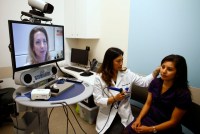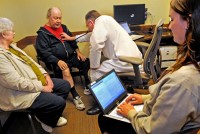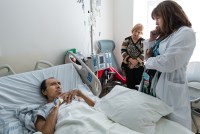Latest KFF Health News Stories
New Kaiser Permanente Med School Part Of A Growing Trend
Twenty new schools opened in the past decade; but some doubt whether so many new doctors are needed.
Kaiser Permanente To Open Medical School In Southern California
Kaiser Permanente CEO Bernard Tyson says the new school is part of the HMO’s effort to transform the “health care ecosystem” in the 21st century.
Connecticut Governor Targets Hospital Funds To Close Budget Gap
When Gov. Dannel Malloy pushed to tax Connecticut hospitals in 2012, he said the money would come back to the institutions through state funding. Now the hospital association says he is reneging, and they are threatening a lawsuit.
Many Hospitals Neglect Practices To Combat ER Overcrowding, Study Finds
Overcrowding in the emergency department can lead to worse outcomes for patients but too few hospitals implement successful programs.
Medicare Penalizes 758 Hospitals For Safety Incidents
More than half of these hospitals were also punished last year as the government tries to leverage taxpayer money to improve the quality of care.
758 Hospitals Penalized For Patient Safety In 2016: Data Table
Medicare is lowering its 2016 payments by 1 percent for 758 hospitals with high rates of potentially avoidable infections and complications such as blood clots, bed sores and falls. This is the second year of the Hospital-Acquired Conditions Reduction Program, which was mandated by the federal health law to reduce patient injuries. Below are the […]
Medical Training So Dark Many Students Depict Supervisors As Monsters – Literally
Studies find many medical students and residents often are so traumatized by training experiences they test positive for depression.
Cigna CEO David Cordani: ACA Marketplace Is Still In ‘Version 1.0’
In a recent interview, Cordani discussed the evolution of exchange health plans as well the proposed merger between Cigna and Anthem.
Jobs For Medical Scribes Are Rising Rapidly But Standards Lag
More scribes are joining doctors in exam rooms with patients to assist with electronic health records, but not everyone is sold on the practice.
After 3 Years Of Decline, Hospital Injury Rates Plateau, Report Finds
The federal report estimates that 12 of every 100 hospital stays included an infection or other avoidable complication in 2014, about the same rate as 2013. Still, that was 17 lower than 2010.
Aid-In-Dying Laws Only Accentuate Need For Palliative Care, Providers Say
Doctors who minister to seriously ill patients say the flurry of aid-in-dying laws show just how afraid people are of a painful death, and how important it is to ease their suffering.
Sweet Name Of Kids’ Clinic Gives Some People Heartburn
The Krispy Kreme Challenge Children’s Specialty Clinic gets its name from a student-run charity race in Raleigh, N.C., that has already raised $1 million for kids. Still, some find the name unhealthy.
Patients Want To Price-Shop For Care, But Online Tools Unreliable
A tough diagnosis and a high-deductible insurance plan motivated one couple to shop carefully for care. But they hit a snag — inaccurate prices on online calculators. Who can comparison shop if the price tags are wrong?
End Of Medicare Bonus Program Will Cut Pay To Primary Care Doctors
A 10 percent bump in pay, a health law provision that sunsets at the end of the year, was designed to help balance the reimbursement levels between primary care providers and specialists.
Small Coastal California Town Fights To Keep Hospital Afloat
Tourists love the Mendocino coast for its redwoods, surf and charm. But the battle to keep one town’s only hospital afloat is pitting hospital administrators and doctors against each other.
UnitedHealth Warns Of Marketplace Exit – Start Of A Trend Or Push For White House Action?
Some analysts and health policy experts view the move as an effort to compel the Obama administration to make changes.
In Caring For Sickest Infants, Doctors Tap Parents For Tough Calls
Doctors were once unquestioned authorities on how aggressively to treat the sickest and most premature babies. Now, they increasingly include parents in these wrenching choices.
A Sick Newborn, A Loving Family And A Litany Of Wrenching Choices
In deciding how far to go in treating their very sick and premature baby, one San Francisco couple acted out of hope, not always in sync with doctors and nurses.
Depressed? Look For Help From A Human, Not A Computer
Researchers asked people with depression to use an online cognitive behavioral therapy program at home. It helped no more than primary care visits. Most said they were too depressed to use it.
It’s On The Test: New Questions Require Doctors To Learn About Military Medicine
Medical licensing exams will include questions about military medicine, encouraging doctors to recognize and learn how to treat problems like PTSD.

























